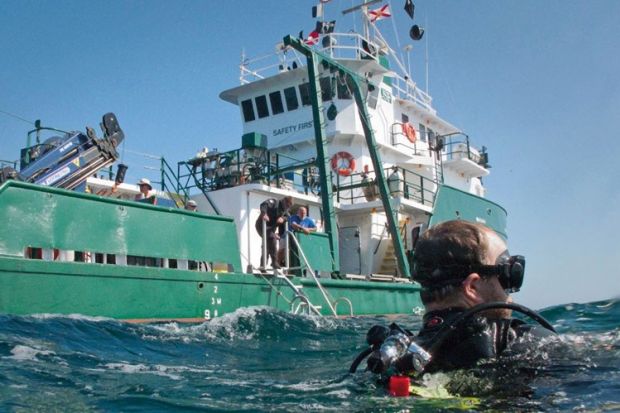Source: Florida Institute of Oceanography
Troubled waters: The R/V Weatherbird II, a research vessel, detected plumes of oil in the Gulf of Mexico after the disaster
Sleek sailboats glide into the Gulf of Mexico from St Petersburg’s Bayboro Harbor underneath the graceful causeways spanning Tampa Bay. Along the shore, high-priced apartment buildings, offering the premium of water views, rise over packed marinas. Nearby, marine science start-ups share the seafront with working fishing boats and a sprawling US Coast Guard base, its oceangoing cutters moored against the concrete sea wall.
In the midst of all this activity, these days one of the busiest places in this part of St Petersburg is the small campus of the Florida Institute of Oceanography, headquarters of a consortium of marine research institutes and universities.
Despite the importance of the marine economy to tourism, fishing and other industries – it is worth $17.5 billion (£10.6 billion) and 228,000 jobs to Florida alone –organisations that study the ocean were so strapped for money not long ago that at least one, Florida Atlantic University, was forced to sell its research vessel. But now, the Florida Institute of Oceanography is enjoying an infusion of cash from what might seem the most unexpected of sources: BP, the British company whose offshore oil rig disaster caused the biggest oil spill in US history, four years ago this month.
“It’s sad to think you had to have an environmental disaster of this magnitude to support us in understanding the ecology of the Gulf of Mexico, which is a multibilliondollar economic resource,” said Bill Hogarth, the institute’s director. “We have shipping, we have fishing, we have oil. The fact that we didn’t invest in having the basic information to determine impacts very quickly – this incident really brought that to people’s attention.”
The explosion at BP’s Deepwater Horizon oil rig on 20 April 2010 killed 11 workers and an estimated 4.9 million barrels of oil leaked into the Gulf from a broken pipe 1,500m below the surface before it was finally closed off three months later.
The company has pledged up to $500 million for research to assess and monitor the Gulf over the first 10 years after the spill. Scientists may be eligible for as much as an additional $200 million from BP, depending on the final formula that is reached for dividing up the money from fines that could reach almost $20 billion, according to media reports.
About $11 million of this money has already been channelled into three years of studies, paid for by BP but managed by an independent panel, into the impact of the oil and the chemicals dumped into the water to disperse it.
Nearly 100 investigators and about 60 students and postdoctoral research associates are at work determining the extent of the damage, understanding how the ecosystem is recovering and designing new kinds of permanent observation systems.
They have already found fish with skin lesions and hydrocarbons in their livers, the result of contact with oil that scientists from the University of South Florida say has come as close as 80 miles (130km) to the Florida coast, although BP disputes the claim that any oil came that close to the shore.

The research also suggests that particles of oil remain buried in the bottom sediment and could stay there for as long as 100 years, and that such deposits have killed off microscopic creatures that play a key part in the aquatic food chain.
The BP money “has expanded the science”, Dr Hogarth said, and the involvement of researchers from eight countries means that “we are having a great interchange of expertise we would not have had, and can draw some of the brightest graduate students”.
It has also served to highlight the lack of attention previously given to ocean science. The 115ft deepwater research vessel docked outside the institute, the R/V Weatherbird II, for example, discovered subsea plumes of oil boiling from the oil rig. It is old and needs to be replaced, but the BP money is reserved for operating, not capital, costs.
Before now, “it was always difficult to get the money we needed into the Gulf”, said Dr Hogarth, who was formerly director of the US National Marine Fisheries Service and chairman of the International Whaling Commission.
Without such resources, he said, we run the risk “of not understanding any type of environmental event that takes place, or the risks of global warming and climate change, sea-level change, and the effect on marine populations”.
Aside from the BP commitments, US spending on marine research, administered by the National Science Foundation, is falling behind the rate of inflation. It is a victim of contentious government budget cuts and the fact that, Dr Hogarth said, people “don’t pay attention till a crisis, and then they remember it for about two days”.
Much of what is being spent is going to high fixed costs, such as those required to operate a new system of ocean sensors called the Ocean Observatories Initiative.
“We’re not spending enough” on basic ocean research, said Deborah Bronk, a professor at the Virginia Institute of Marine Science and past president of the Association for the Sciences of Limnology and Oceanography. “If you look at the changes that we’re seeing on the planet, if we want to have any predictive understanding of what’s going to happen, the oceans are vastly understudied.”
As oil companies drill in even deeper waters, Dr Hogarth warned that the chance of another spill such as the disastrous Deepwater Horizon event “is a possibility. A very good possibility.” But is oceanographic research now in a better position to help, with the money from BP?
“Yes,” he said. “But maybe not enough.”
Register to continue
Why register?
- Registration is free and only takes a moment
- Once registered, you can read 3 articles a month
- Sign up for our newsletter
Subscribe
Or subscribe for unlimited access to:
- Unlimited access to news, views, insights & reviews
- Digital editions
- Digital access to THE’s university and college rankings analysis
Already registered or a current subscriber? Login





